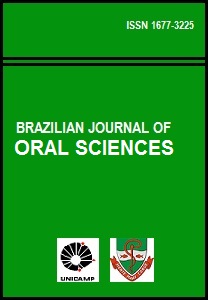Abstract
Aim: To evaluate the fracture strength of ceramic brackets submitted to archwire torsional strain. Methods: Different types of maxillary central incisor ceramic brackets from four different commercial brands, Roth prescription (0.022" x 0.028"), were evaluated, namely: Mystique (GAC), InVu (TP Orthodontics), Clarity (3M Unitek) and Luxi II (RMO Ortohodontics). To evaluate the fracture strength, 0.019"x 0.025" stainless steel orthodontic wires were inserted into the bracket channels and submitted to torsion until they fractured. Results: The InVu brackets showed a significantly higher fracture strength than the other brackets (p<0.05), which did not differ significantly among them (p>0.05). Conclusions: Among the brackets tested, the traditional ceramic bracket InVu showed the highest fracture strength, while the Luxi II bracket, obtained the lowest value.The Brazilian Journal of Oral Sciences uses the Creative Commons license (CC), thus preserving the integrity of the articles in an open access environment.
Downloads
Download data is not yet available.

